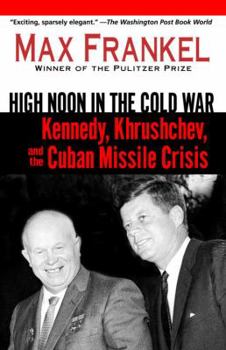High Noon in the Cold War: Kennedy, Krushchev, and the Cuban Missile Crisis
Select Format
Select Condition 
Book Overview
One of the giants of American journalism now re-creates an unforgettable time-in which the whole world feared extinction. High Noon in the Cold War captures the Cuban Missile Crisis in a new light, from inside the hearts and minds of the famous men who provoked and, in the nick of time, resolved the confrontation. Using his personal memories of covering the conflict, and gathering evidence from recent records and new scholarship and...
Format:Paperback
Language:English
ISBN:0345466713
ISBN13:9780345466716
Release Date:September 2005
Publisher:Presidio Press
Length:206 Pages
Weight:0.45 lbs.
Dimensions:0.5" x 5.5" x 8.1"
Customer Reviews
3 ratings
This book is very well done.
Published by Thriftbooks.com User , 17 years ago
I really enjoyed this book. It is an easy read and the author has done a great job in his research. I thought the perspective he presented about what it was about the 2 leaders personally that allowed this situation to occur was very interesting. I also enjoyed the lack of bias. The situation was presented as neutral as possible I believe.
Highly recommended!
Published by Thriftbooks.com User , 18 years ago
Most Americans know the Hollywood mythology of the Cuban missile crisis. Our collective assessment of the significance of this national security crisis, the participants and the process, has been largely shaped by emotion, fantasy and politics. Max Frankel in his remarkable new book, High Noon in the Cold War, has changed all that. Frankel shares the real story of this critical series of events like an old friend sitting with us in front of a flickering fire on a crisp fall evening. Gracefully he enlightens and fascinates with well-crafted portraits of John F. Kennedy, his close advisors, those in the periphery at the Pentagon and in the Congress, and their counterparts in Moscow and Havana. High Noon presents the story without the bluster and self-confidence of history written by the winners, and instead allows us into the hearts and minds of the key decision-makers and their world that autumn of 1962. John F. Kennedy, privately pain-wracked and publicly politically assaulted for his youth and a lack of seriousness in 1962, played this game of global chess, in part by doing what one might believe any president would do. He consulted with a variety of advisors, trusted and some less trusted, and he attempted to more deeply understand what Khrushchev's first surprising call of "Check!" required of America. Frankel does a wonderful job of putting the reader inside the pressure cooker of the Executive Committee as well as insightfully portraying the extensive series of possible moves weighed minute by minute by John Kennedy himself. The deliberation and debate in both Washington and Moscow, after false starts and misunderstood and mixed messages resulted in the American declaration of a Cuban blockade-lite, described as a quarantine, implemented with a sensitivity that seemed at times an affront to Navy tradition. The eventual resolution surprisingly satisfied America, satisfied the Soviets, and only Fidel Castro felt betrayed at the immediate outcome. The Soviet nuclear-capable SS-4 Medium Range Ballistic Missiles were removed from Cuba, as were the Soviet strategic IL-28 bombers. Khrushchev allowed Castro to retain the defensive antiaircraft batteries provided he not use them against American U-2 high altitude surveillance planes, left a 3,000 man Soviet combat brigade on the island, and Castro was promised that he would never have to pay for any future Soviet defensive weaponry. In return, Khrushchev received a direct and very public pledge that the United States would never invade Cuba, and a secret pledge that the United Stated would dismantle the obsolete but symbolic Jupiter medium range ballistic missile from Turkey within five months time. Later in 1962, Castro accepted $53 million in American medical supplies and baby food in return for his release of 1,113 survivors of the Bay of Pigs invasion. Frankel portrays the facts of the resolution of the Cuban Missile crisis cogently, but it is in his exploration of the dramatic and frenetic in
SHOULD BE READ BY ALL PEOPLE WHO ASSUME THEY KNOW IT ALL -
Published by Thriftbooks.com User , 19 years ago
NO MATTER HOW YOU LOOK AT IT, THIS IS AN EXCELLENT BOOK. IT'S TAKES A SUBJECT, THE FACTS ABOUT WHICH HAVE BEEN BEATEN TO DEATH IN ALL MEDIA FORMS, AND FOR ONCE, ALLOWS YOU TO COME AWAY WITH A CLEAR, FACTUAL, THOROUGH, UNCOMPLICATED, UNBIASED UNDERSTANDING OF EXACTLY WHAT TOOK PLACE. IT'S LIKE CUTTING THROUGH BUTTER WITH A HOT KNIFE. IF THIS SUBJECT INTERESTS YOU, IT'S A MUST READ.





